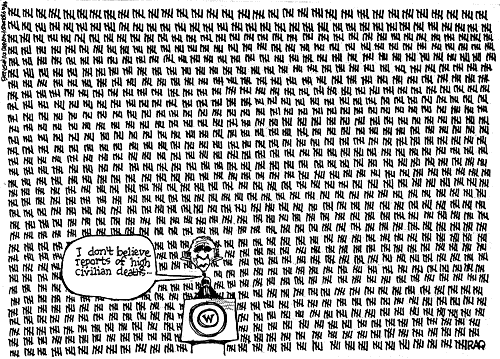WASHINGTON, Oct. 19 — President Bush’s chief spokesman conceded today that the latest carnage in Iraq was somewhat reminiscent of the 1968 Tet offensive in Vietnam, which helped to turn public opinion against the war in Southeast Asia. But he said the president still envisioned victory in Iraq.
The surge in violence in Iraq is a reminder “that terrorists try to exploit pictures and try to use the media as conduits for influencing public opinion in the United States,” Tony Snow, the White House spokesman, said as Mr. Bush prepared to campaign for Republicans today in Pennsylvania and Virginia.
Mr. Snow fielded questions at a particularly delicate time: just after a senior American officer in Iraq said that the current approach to stemming the chaos in Baghdad was not working, and as the approaching Congressional elections are stoking fears of a Republican disaster because of the war.
Mr. Snow recalled that while the Tet offensive may have been the tipping point as far as American public opinion was concerned, it was later found to have been extremely costly for the Communists — arguably a “victory” for the United States military. But the American public was so tired of the war by that time that President Lyndon B. Johnson was driven into retirement, and Richard Nixon was elected in part on a pledge to end the conflict.
Asked if he saw a similar portent in Iraq, Mr. Snow replied: “No. The important thing to remember is the president’s determined to win.” The administration will “make adjustments as necessary,” Mr. Snow said, “but the one thing that nobody should have any doubt about is that we’re going to win.”
President Bush himself acknowledged the possible parallel between the Tet offensive and the bloodletting in Iraq, as suggested by Thomas L. Friedman in a column in The New York Times.
“He could be right,” Mr. Bush said on Wednesday in an interview with George Stephanopoulos of ABC. “There’s certainly a stepped-up level of violence, and we’re heading into an election.” Mr. Bush went on to say, “They believe that if they can create enough chaos, the American people will grow sick and tired of the Iraqi effort.”
The White House has long resisted suggestions that, in embarking on a war in Iraq, the United States may be sliding into a Vietnam-like “quagmire.” Mr. Bush and his commanders have vowed to adjust tactics as needed in the drive to establish an Iraq that is free, stable and able to defend itself.
Maj. Gen. William B. Caldwell IV, the senior military spokesman in Iraq, said today that the approach of concentrating on a limited number of troubled enclaves in Baghdad was not working as well as expected, and that the upsurge in violence in the Baghdad area was “disheartening.”
Mr. Snow, the White House spokesman, emphasized that he accepted the parallel with the Tet offensive only in a “very limited” context: an attempt by an enemy to influence American public opinion just before an election.
“We do not think that there’s been a flip-over point,” he said. “But more importantly, from the standpoint of the government and the standpoint of this administration, we are going to continue pursuing victory aggressively.” To do otherwise, the White House has said repeatedly, would be to allow Iraq to become a spawning ground for terrorists.

